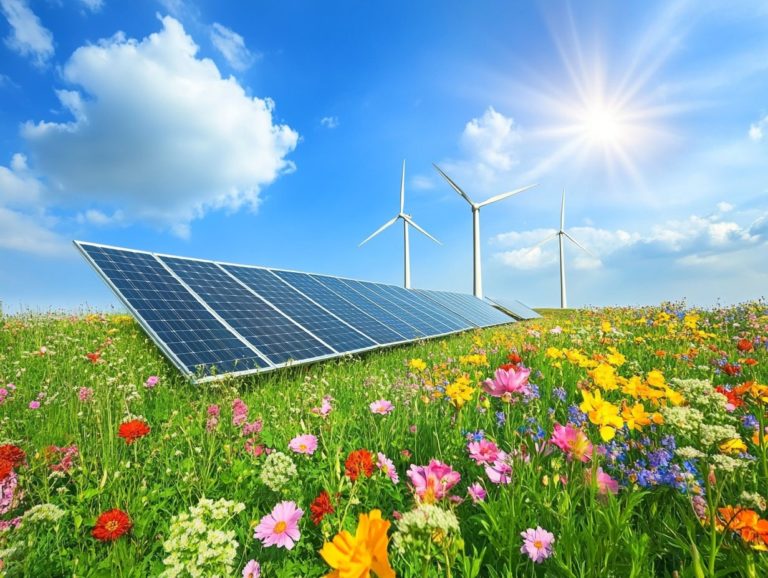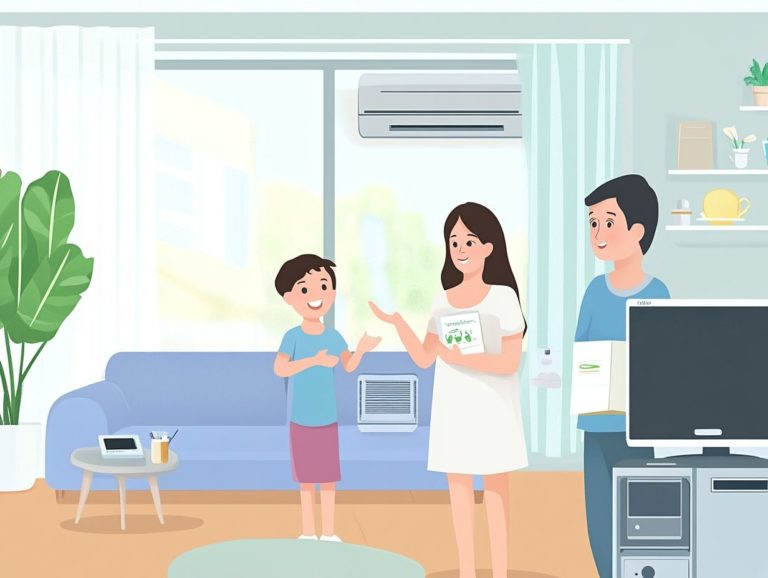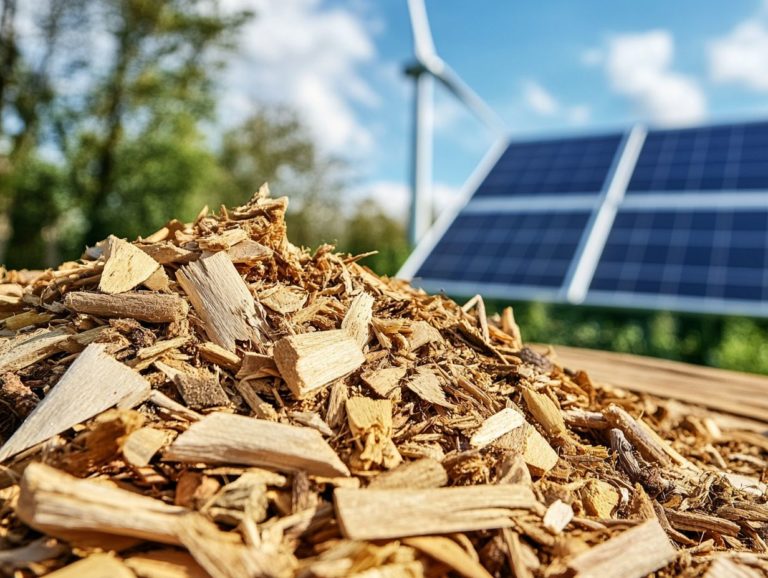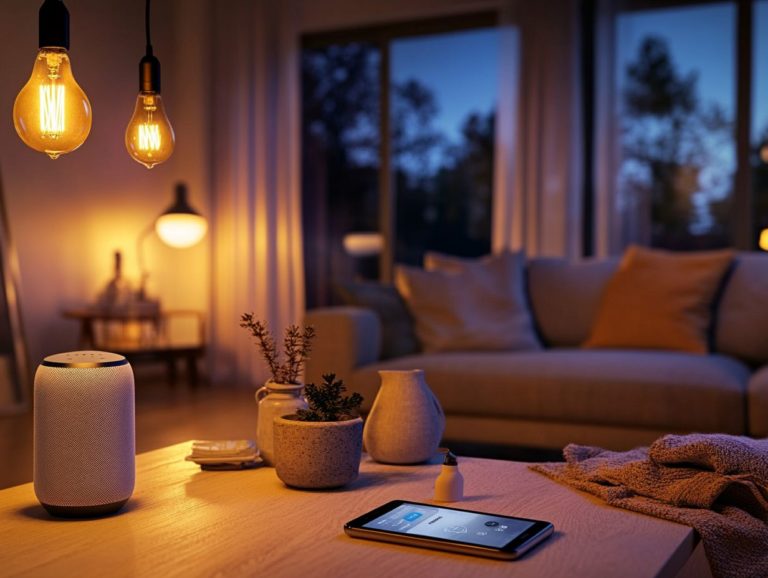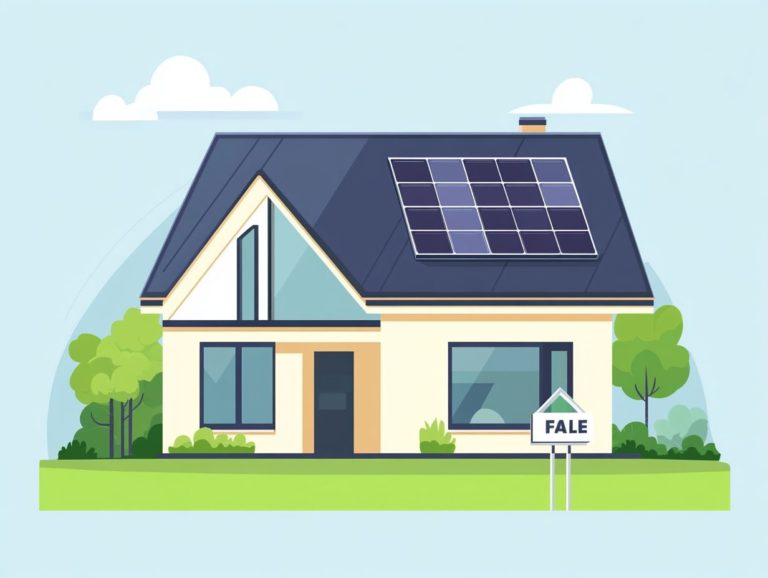How Can I Find Local Energy Efficiency Programs?
Ready to save on your energy bills? Energy efficiency programs are essential for reducing energy consumption and lowering utility bills, all while fostering a sustainable environment. This article delves into the diverse array of programs available spanning residential, commercial, and government initiatives and underscores the myriad benefits of participating.
You ll discover how to identify local energy efficiency programs through thorough online research, government resources, and personal recommendations.
Insightful tips will guide you in evaluating and selecting the program that aligns perfectly with your needs. Uncover how you can save both energy and money, all while making a meaningful contribution to a greener future.
Contents
- Key Takeaways:
- Understanding Energy Efficiency Programs
- Types of Local Energy Efficiency Programs
- How to Find Local Energy Efficiency Programs
- Evaluating and Choosing the Right Program
- Frequently Asked Questions
- What are some tips for finding local energy efficiency programs?
- Are there any specific resources I can use to find local energy efficiency programs?
- How can I determine which energy efficiency programs are available in my area?
- What types of energy efficiency programs are typically offered at the local level?
- Do I have to meet certain qualifications to participate in local energy efficiency programs?
- Are there any costs associated with participating in local energy efficiency programs?
Key Takeaways:

- Explore local energy efficiency programs to reduce your utility bills and contribute to a greener environment.
- Residential, commercial, and government programs offer different benefits and incentives for energy efficiency.
- Research online, contact local government agencies, and ask for recommendations to find the best energy efficiency program for your needs.
Understanding Energy Efficiency Programs
Understanding energy efficiency programs is essential for low-income households. These financial incentives specifically target their needs, helping to alleviate the high cost of energy bills while improving their health and comfort.
These programs, typically launched by local governments, community organizations, and utility companies, include tax incentives and rebates for making energy-efficient upgrades. Their primary goal is to reduce energy costs, enhance energy performance, and significantly lower carbon emissions through initiatives like home energy audits and weatherization assistance, which are evaluations of how much energy your home uses and where you can save, as well as appliance recycling.
In a world increasingly focused on sustainability, being informed about these programs can lead to significant opportunities and a meaningful reduction in overall consumption.
What are Energy Efficiency Programs?
Energy efficiency programs promote the adoption of energy-efficient appliances, including ENERGY STAR certified models, and practices in your home or business, all with the goal of reducing overall energy consumption.
These initiatives offer a range of strategies and tools, including energy audits that evaluate your current usage and pinpoint potential savings. You ll also find utility incentives designed to motivate you to upgrade to more efficient systems.
For low-income households, these financial incentives specifically target their needs, making it easier for you to invest in improvements that yield significant long-term savings. By collaborating with local utilities and communities, these programs strive to cultivate a sustainable approach to energy consumption, ultimately benefiting both the environment and the economy.
Benefits of Participating in Energy Efficiency Programs
Participating in energy efficiency programs presents a wealth of benefits, especially for low-income households. You can enjoy significant energy savings, improved health and comfort, and a reduction in carbon emissions.
These initiatives are vital in alleviating energy burdens, allowing families like yours to allocate resources more effectively toward essentials such as food and education. Improved living conditions go beyond mere savings on utility bills; they foster healthier homes with better air quality and temperature regulation, greatly enhancing the well-being of residents.
Financial incentives like rebates and tax credits motivate households to get involved in these programs. This not only encourages widespread participation but also cultivates a culture of sustainability within the community.
Types of Local Energy Efficiency Programs
Local energy efficiency programs offer a diverse array of initiatives designed to target various sectors, including residential, commercial, and government programs. Each of these programs is meticulously crafted to meet the specific energy consumption patterns and effectively address the needs of its audience.
Transform Your Home with Energy Efficiency Programs!
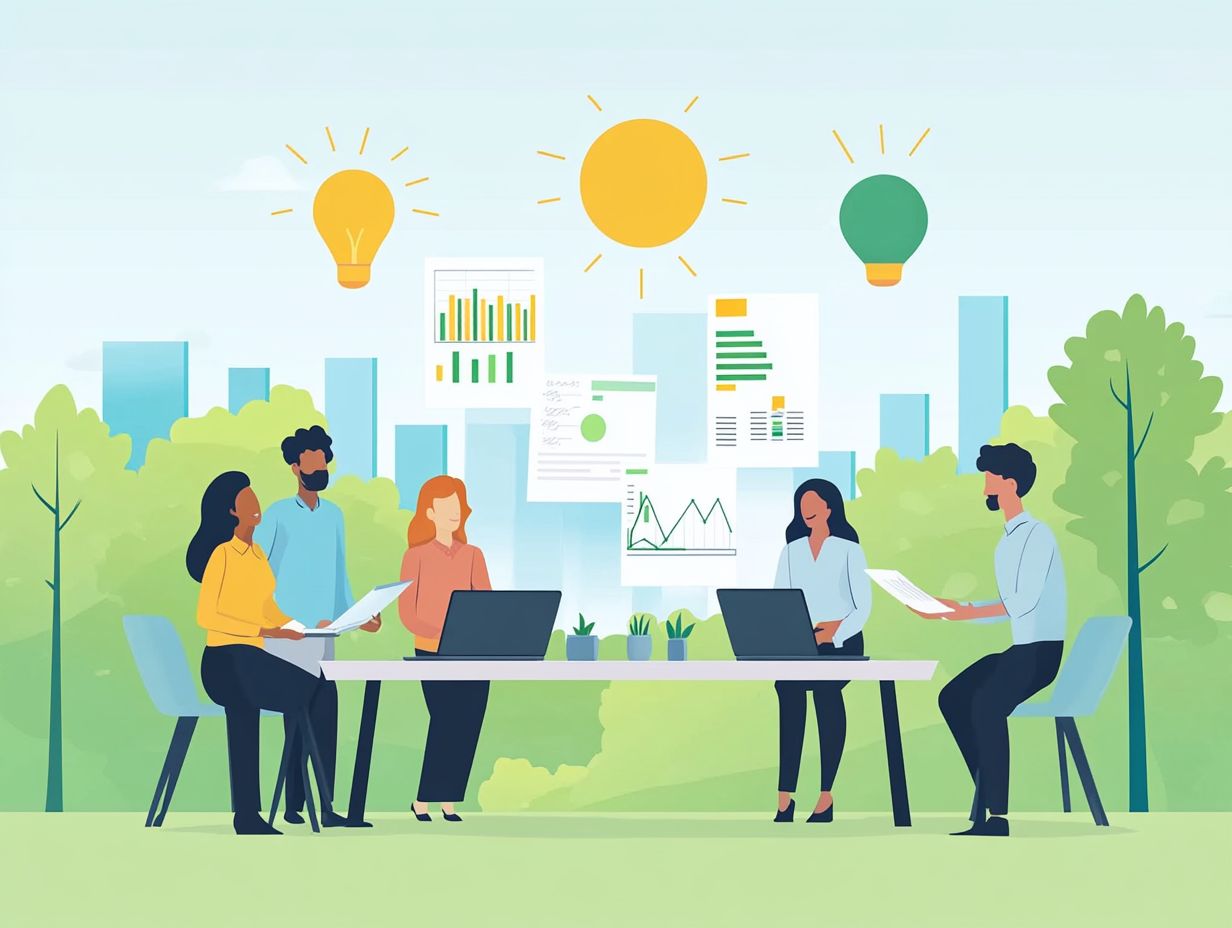
Residential energy efficiency programs are crafted to help you, whether you’re a homeowner or a renter, significantly cut down on energy costs. These initiatives include detailed energy assessments, weatherization assistance, and financial support for purchasing energy-efficient appliances.
You ll receive assessments of your energy usage that pinpoint areas for improvement, like upgrading insulation or enhancing air sealing. As a participant, you could unlock exciting savings with financial incentives, including rebates or low-interest loans.
By opting for energy-efficient windows, HVAC systems (heating, ventilation, and air conditioning systems), and appliances, you can substantially reduce your overall energy consumption. The long-term rewards extend beyond lower utility bills; they also contribute to enhanced environmental sustainability, making energy-efficient practices a smart choice for today s eco-conscious households.
Maximize Your Business Potential with Commercial Programs!
Commercial energy efficiency programs are tailored for businesses and organizations, offering a wealth of incentives to enhance energy performance while cutting operational costs.
Engaging in these programs provides access to various financial incentives from utility companies, significantly alleviating the initial investment required for upgrades. These improvements help you comply with building codes and support sustainable practices that appeal to eco-conscious consumers.
As you streamline energy usage, you ll notice a significant drop in your energy costs, improving profit margins and bolstering your corporate image. Ultimately, integrating energy-efficient upgrades leads to substantial long-term savings and a reduced environmental footprint, positioning your organization as a sustainability leader.
Government Programs: Your Partner in Energy Efficiency!
Government programs are crucial for promoting energy efficiency. They provide funding and resources to support low-income households and tailored energy services.
These initiatives include rebates for energy-efficient appliances, grants for home retrofitting, and community energy efficiency programs. To maximize these efforts, homeowners can learn how to evaluate energy efficiency in your home. State energy offices play a vital role in executing these programs by coordinating resources and ensuring assistance reaches those who need it most.
This involvement helps lower energy bills and contributes to a broader commitment to sustainable practices. It creates an environment where residents and the planet benefit from reduced consumption and improved energy practices.
How to Find Local Energy Efficiency Programs
Want to save on your energy bills? Here s how you can find local energy efficiency programs! You can discover local energy efficiency programs through various effective methods. Consider online research, contacting local government agencies for insights, or reaching out to community organizations specializing in energy information.
Each of these avenues can provide the guidance and support you need. Start saving today! Let s find the best programs for you!
Researching Online
Researching online is one of the most effective ways to uncover energy efficiency programs available through local governments and utility providers. By utilizing various online search tools, you can access a wealth of information tailored to your region and individual needs.
A great starting point is the official websites of your local government, where you’ll find resources regarding energy-saving initiatives and incentives. For more detailed guidance, consider exploring how you can make your home more energy efficient. Many utility companies also feature sections on their sites highlighting rebates and programs aimed at helping you reduce consumption.
Searching for terms like “energy audits,” “rebate programs,” or “renewable energy initiatives” can guide you to specific information that matches your goals. This approach not only promotes sustainable living but can also help you learn how to advocate for energy efficiency, leading to significant reductions in your household expenses.
Contacting Local Government Agencies

Contacting local government agencies is a smart move. It can unlock valuable insights into energy efficiency programs and utility incentives to improve your energy use.
By reaching out, you gain access to tailored information for your needs. These agencies help you discover community organizations and energy services that provide extra support.
For example, local representatives can connect you with non-profit groups specializing in energy conservation. They can recommend workshops to educate homeowners or inform you about financial aid programs that make upgrades easier.
Engaging with local authorities is a proactive way to maximize your energy savings and support your community.
Asking for Recommendations
Requesting recommendations from community organizations and energy advisors helps you find energy efficiency programs tailored to your needs.
These local connections offer personalized guidance for navigating community initiatives. Engaging with these networks can uncover various programs aimed at reducing energy use.
Connecting with these resources not only supports local jobs but also builds partnerships committed to sustainability. Leveraging the expertise of energy advisors helps you make informed decisions for financial savings and positive environmental impacts.
Evaluating and Choosing the Right Program
Choosing the right energy efficiency program can unlock great benefits. Consider factors like the program’s offerings, participant reviews, and potential energy savings.
Assessing these elements helps you make a decision that aligns with your goals.
Factors to Consider
When evaluating energy efficiency programs, consider key factors: potential energy savings, available financial incentives, and eligibility requirements for low-income households.
These elements determine your participation and ensure you can maximize benefits. Understanding energy savings can significantly affect your utility costs.
Exploring financial incentives, like rebates or tax credits, can make programs more attractive and accessible. For those in low-income brackets, finding tailored options is essential to overcoming economic barriers to energy efficiency.
Reading Reviews and Feedback
Reading reviews from past participants gives you invaluable insights into energy efficiency programs. Analyzing these perspectives reveals patterns in customer satisfaction and areas for improvement.
Engaging with community members through surveys or discussion forums deepens your understanding and fosters collaboration.
Both positive and negative feedback are crucial. Each provides context on how initiatives impact daily lives, lower utility costs, and promote sustainability.
This input shapes future program designs and strengthens community ties, enhancing participation and success.
Frequently Asked Questions

What are some tips for finding local energy efficiency programs?
Finding local energy efficiency programs can be easy! Start by checking with your city or county government.
You can also research online, ask friends or neighbors for recommendations, and contact local utility companies.
Are there any specific resources I can use to find local energy efficiency programs?
Yes! You can use various resources to discover these programs.
Some great options include the EnergyStar website, the Database of State Incentives for Renewables and Efficiency (DSIRE), and the American Council for an Energy-Efficient Economy (ACEEE) website.
How can I determine which energy efficiency programs are available in my area?
Discovering energy efficiency programs in your area is easy! You can research online, contact local government offices or utility companies, and check with organizations that promote energy efficiency.
What types of energy efficiency programs are typically offered at the local level?
Common local energy efficiency programs include home energy audits and assistance to improve your home’s insulation.
You can also find energy efficiency rebates, incentives, and educational outreach programs.
Do I have to meet certain qualifications to participate in local energy efficiency programs?
Some programs have eligibility requirements based on income or property type.
Make sure to contact each program to find out if you qualify!
Are there any costs associated with participating in local energy efficiency programs?
Some programs may charge a small fee or require an upfront investment.
However, many are designed to save you money in the long run. Be sure to read program details carefully and ask any questions before participating.

